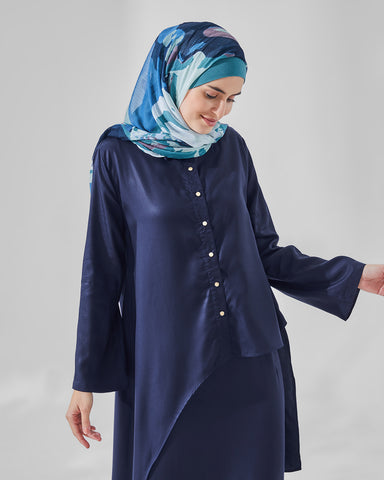5 Major Misconceptions About Hijabi Women
Hijabi women are one of the most misunderstood groups. People on the outside of Muslim culture often don’t understand the nature of veiling, veiling requirements, and the intricacies of Muslim culture and women’s place in it. It’s easy for outsiders to be influenced by news, television, and other media that misconstrued what it means to be a hijab wearing woman. So, we are going to tackle five big misconceptions about hijabis, and how you can think more accurately about what they’re really like.

Colorful Instant Hijabs from the Dégradé Collection
The Hijab Is Forced
Theres is a major misconception in non-Muslim societies that the Hijab is something that is to be forced on women–which is simply incorrect. Wearing hijab is a choice that each Muslim woman should come to on her own terms. The choice to veil is part of a woman’s personal walk with God, and should be a choice of agency. Yes, there are places in the world where the hijab is forced upon women–but such circumstances are not the will of Allah, they are a perversion of Allah’s will.

Men shall have a share of what they have earned, and women shall have a share of what they have earned. (Do not envy each other) but ask God to give you of His bounty. God has knowledge of all things. (Qur‘an 4:31-32)
Muslim Women are Conservative

The hijab is undoubtedly a sign of devotion to Allah, but the hijab is not a sure-fire indicator of a woman’s political and social stances. Wearing a veil simply isn’t an indicator of how religious a woman is, or what she believes about the world at large. Some Muslim women even wear hijab as more of a fashion statement for a religious purpose. Veil wearing women are not a monolith–they hold different beliefs about the nature of justice, social customs, and politics.
Hijabs Mean No Style Options


Click on the World Traveller Collection to see the Paris Print
& For the Ruffled Shirt - Pencil Skirt - Wrapped Skirt - Two length Top
They are all available under the "Clothing" section
We take this one personally. Some believe the misconception that wearing a hijab means style is off the table, which simply isn’t true. Veiling dictates that women should dress modestly, and cover all of that which is not apparent. This leaves plenty room for style. All clothing styles are on the table, as long as they appeal to modesty. Hijabis can do formalwear like dresses and blazers. They can do streetwear like hoodies, jeans, and cargo pants. Unusual and fun style options like overalls and jumpsuits. Hijabs are an extra style option–a great accessory to add flare and colour to an outfit.
Veiled Women Have No Voice

One major stereotype about veiled women is that they are “voiceless,” that they don’t participate in society, and aren’t allowed to achieve great things. Today and throughout history, hijabi women have achieved amazing feats. Especially in our modern world, this stereotype has begun to fall away, as hijab wearing women make history. Rep. Ilhan Omar became America’s first hijabi congresswoman, Ibtihaj Mohammad was the first hijabi Olympic Gold Medalist, and Stephanie Kurlow is the world’s first hijabi professional ballerina. As always, hijabi women are pushing boundaries, making history, and achieving great things in modern society.
All Practising Muslims Wear Hijab

One major misconception about hijabi women is that you must be hijabi to be a practicing Muslim–which simply isn’t true. It’s important to remember that while hijab is commanded for women, it’s not one of the five pillars of Islam. There are veiled women who don’t pray, fast, or uphold the other pillars. Likewise, there are non-veiling women who uphold all five pillars. Remember–veiling is not necessarily an indicator of how religious someone is. Women wear the veil for both religious and cultural reasons.








Leave a comment